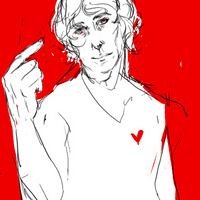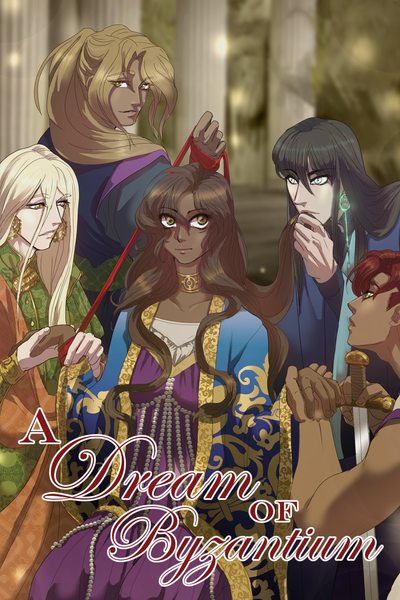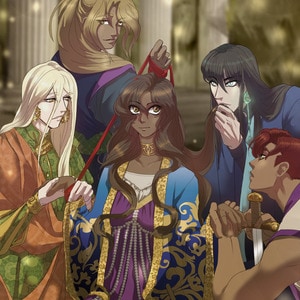Ophelia stood behind as Aristides and Phobos dealt with the men at the gates. Her curiosity was picked as she observed papers changing hands along small linen bags that clearly contained some coins.
“Is it a toll or a bribe?” she asked the nearest warrior, who turned out to be Remulus.
“A toll,” he replied. “Caudiceum is not that kind of place.”
Ophelia let her eye wander around the impressive fortifications, peeking at the views of the sea beyond the gate. She noticed that Aristides was waving his hand at her, and figured he was asking her to come over.
“Here, officer,” the wise man of the merry band of warriors said as soon as she was within earshot. “She’s the bride to be.”
The scholar crossed gazes with her: in that split second a whole conversation happened. Ophelia knew, the moment she turned towards the officer, that she had a role to play.
“That’s me,” she smiled awkwardly.
The two watchmen were smiling amusedly, sneaking glances between her and Phobos. “What a pair; I can see why you had to elope, merchant. A Phrygian like yourself and a Hibernian runaway?”
“Love knows no boundaries,” Phobos replied, his speech somehow heavily accented. Such a passionate statement in his stoic, serious face was a funny thing thing to see. Ophelia snickered in spite of herself, and so did the watchmen.
“Even your bride doesn’t believe that,” one of them said. Both Phobos and Aristides turned to look at her with some surprise.
“I’m just happy I ignored what my mother said about Phrygian men; they’re certainly a fascinating bunch at night,” Ophelia just ran with the character, not really knowing what she was saying. Regardless of culture or whether it was in the real or dream world, the language of naughtiness was universal, and both watchmen broke out in laughter.
“Very well, very well, let’s stop teasing these love birds,” they conceded. “Off you go, Phrygian. Hopefully we won’t have to deal with a bunch of angry Hibernians tomorrow.”
Papers were returned and the three of them rejoined their retinue in entering the city. Phobos walked closer to her, and Ophelia wondered if they were still supposed to play the part of the lovers.
“Apologies about that. They were a bit suspicious about a strange-looking woman, so we told them that we had eloped.”
“I just hope I did well,” Ophelia shrugged it off.
“You did,” he turned to look at her; there was speculation in his gaze. “You also speak an incredibly fluent Iberian.”
Ophelia regarded him with a confused look. “Excuse me?”
“Ah, we didn’t think you spoke Iberian, we just wanted to show that you weren’t being kidnapped. It turns out you could speak clearer than the guards!”
The woman filed that information for later, deciding to nod silently and hope that he’d drop the subject. It seemed like some of that dream movie magic was afoot, and she had somehow gained the ability to speak multiple languages… without being aware of it.
“Where are we going now?”
“To visit an old friend,” Aristides replied. “We are on our way to Arqa, which is the closest of all the allied city-states. We’re hoping to get them to give us a ship.”
“What’s in Arqa?”
“Possibly, friends of ours. Given it’s entirely neutral it’s a good place to meet all sorts of folks who are… not friends of the Elysian empire.”
“Let’s see how long that neutrality lasts,” Ajax, who was only a step behind them, scoffed. “They’re having their Council meeting soon, and word on the street is that the Elysians are going to pull some tricks to get their way and break the neutrality.”
“They will have to do worse than bringing a bunch of bureaucrats to the council,” commented Remulus.
“Oh no, they’re bringing the head of the Knights of the Black Sun himself, my friend.”
“Who are they?” Ophelia asked.
“They’re the elite force of the Elysian army,” Ilmarinen replied. “All nobles.”
The warriors looked decidedly dour at the mere mention of the knights. “Are they really bad or something?”
That earned her a few bewildered looks. “Bad?” exclaimed the small warrior whose name she hadn’t learnt yet. “I suppose; they’re just inhuman. Have you never heard of them?”
Ophelia shook her head.
“But you do know about the Elysian nobles, right?” Another shake of her head.
“You must be taking the piss,” Ajax said. “Even in the backwaters of Hibernia they should know.”
Ophelia’s brow furrowed. “Are you going to tell me or are you going to keep skirting around it?”
“Ow, there’s the princess! My bad, my bad,” Ajax shrunk back into himself, almost comically. “The Elysian nobles are all different, your highness. They’re all born with some special abilities the rest of us mere mortals could not even dream of having.”
“They’re physically weaker,” Phobos commented, “they can’t wield a longsword in one hand, and only the burly ones can throw spears like we do. They can’t run for as long as we do, or as fast, but it doesn’t matter. They can do strange things.”
“Manipulate the elements, or wield invisible forces that can make a man float up into the air or be crushed into a pulp,” Aristides explained. “It only takes a handful of them to deal with three hundred men.”
She could not control her expression; her eyebrow went up before she could stop it. “Sure,” she said, trying not to bring her modern scepticism into a dream argument. Rather than spark any further debate, it just confused the men even more.
The city had been entirely built into slopes; the city gates were surprisingly enough the highest points in the entire perimeter, and were more of a mark of prestige than anything else. It had long been part of the Iberian kingdom, and was less than a half a day’s travel from several fortresses owned by the most powerful earls in the region: this meant that if anything, its biggest threat would always come from the sea. Impressive fjords reached out into the sea, which provided some level of protection; the rest came from an equally awe-inspiring navy, which was so large it had to be constantly rotated in and out of the port to make space for commercial ships.
The houses in the city were square, simple, yet made of brick and plastered over in white. The most daring architects had decorated the top of the structures with painted geometrical friezes: blue and ochre were the most popular colours, but every now and then one could catch sight of some red and green as well. Little gargoyles made of sandstone watched over the spirits of the sea; they were comical, like a child’s depiction of what a mythical being would look like. Although the layout of the streets was dense and sometimes houses had been built on top of other houses, casting shadows onto their neighbour’s backyard, there was plenty of space for trees. They gave a much-needed respite to the harsh sun; the salty air of the sea did not mix well with the heat.
It was busy and provincial at the same time, almost resembling the famous Santorini postcards Ophelia had seen time and time again. If one were inclined to propose to the Santorini authorities to add more rotten fish smell in the air, more pigs running amok between the houses, or naked children chasing their friends, then perhaps it’d come close.
Ophelia fully concentrated on watching her step. She was used to London, of having to dash around Oxford street at two pm on a Saturday to get some cheap hoodie out of Primark, but this was that, and some more. Women would come out unannounced from their houses carrying bucketfuls of dirty, soapy water, and with no warning just unload it onto the street. Those who had no backyards had to carry buckets full of human waste into the nearest cesspit – mostly abandoned lots in between rows of slums. The march of their horses wasn’t of any help – and only contributed to the problem, as the animals would tread on their fresh dung, and the dung of the horses who came before them.
There were sellers as well – and beggars. Again, a Londoner is no stranger to either, but a mouth devoid of any teeth was certainly a rarer sight. If the initial impression of her dream was that of a fantasy past, this initial city break seemed to removed the fantasy out of it.
In the midst of what she assumed were the slums they arrived to what was clearly one of the commercial streets. Cobblers, hat and fabric sellers, blacksmith, grocers, fishmongers, butchers, bakers and taverns all colluded together to create one big open-air shopping mall.
“The weapon dealers are on the other side,” Ajax commented, following her eyes. “The furthest away they can be from the taverns.”
Women and men, old and young walked around either selling or buying. Big wicker baskets and linen bags that hung from shoulders were emptied and filled with produce and goods. The stench turned into fragrance as they passed the bakeries, and the smell of bread invaded the air.
“Here,” Phobos indicated, gesturing towards one of the taverns. The sign hanging outside of the door had a picture of a mermaid, and the name was in a script she didn’t recognise.
Inside it was quiet, with only a handful of people drinking merrily at the tables. Behind the bar there was a woman and a teenage boy; both seemed equally busy cleaning and counting glasses. It was a simple place, with stone walls and exposed wooden beams, and a few tattered tapestries hanging near the fireplace.
Phobos went up to the bar; everyone else chose a table and sat on it. Ophelia followed the latter, wondering about the cost of a pint in a dream.
“This is the only place you can get a decent fish pie at,” said Aristides, who had sat on her right. “Caudicean cuisine is not terribly exciting.”
“Is there a menu?”
“What’s that?” asked Ajax.
“Uh, a list of the things they offer for food.”
“What for? You can just talk to the lady.”
And Phobos had done just that. The lady, the teenage boy and him appeared at the table carrying bowls of potage. “I’ll go get the bread,” said the young man after passing the food to Remulus and Ilmarinen. Ophelia looked down to her bowl and found a mixture of leeks, herbs, cabbages and what seemed to be oats mixed in some sort of soup. It certainly wasn’t the most exciting food she’d eaten, but she was hungry enough that anything that passed through her lips would be like the sweetest nectar.
“No fish pie, Felicia?” complained Aristides.
“You’ll have to wait until dinner, old boy,” replied the tavern woman. “Are you all staying here?”
“We are,” confirmed Phobos. “Ilmarinen, for how long?”
“Perhaps a week, although I’ll know more tomorrow evening.”
“Very well, I think we can fit youse nicely in two rooms…” Felicia’s eyes landed on Ophelia, narrowing ever-so-slightly in the manner of someone who had come across an interesting puzzle to solve. “Or three? Is the lady cargo or someone’s booty?”
“Neither,” Phobos said quickly, his cheeks slightly pink. Perhaps he was reminded of the earlier farce, Ophelia figured. “We found her on our way. She was kidnapped away from her homeland and seemed lost, so we thought we might bring her somewhere where she could stand a chance of making her way back.”
“Ah, a stolen bride?” the woman examined her, eyes intensely studying her features in a way that made Ophelia incredibly uncomfortable. “How strange, you look fresh enough for me to say you’ve never had children of your own, but you’re clearly well past the age of marriage… at least that kind of marriage.”
“I don’t think that’s why I got kidnapped, if I got kidnapped,” Ophelia answered.
“Oh?”
“Uh, it’s a strange tale. I simply woke up somewhere in the forest. Apparently far away from London – that’s Londinium, I guess.”
Felicia exchanged confused glances with Phobos. “A Hibernian? But her Iberian is so clean!”
A few shrugs let the tavern owner know that they were just as bewildered as she was about their little stowaway. “Never mind, so you’re trying to make your way back?”
Ophelia looked down into her bowl. “I’m not in any hurry, if I have to be honest. But I don’t know anyone here; I don’t have any money either.”
Felicia hummed. “Well, you’re in the right place at the right time then! I’m in need of an extra pair of hands. I can’t pay you much, but you’ll have room and food at least!”
Ophelia looked around the place, a small smile suddenly sneaking into her face. Perhaps she could mention that her previous work experience had been entirely in the service industry, although she didn’t think she’d be making macciatos and lates any time soon.
“I’d love that, thank you.”
After their breakfast and beer Felicia led the warriors to their rooms, all of which were in the second floor. Ophelia waited downstairs, helping the teenage boy, whose name she learnt right then and there was Lucio, to clean up the table they’d occupied.
“You should also rest,” her new boss said once she was done settling in the men. “I’ll wake you up in the afternoon so you can help me with the food before supper time.”
She was led to the kitchen, and then onto a small hallway. “Lucio and I sleep here,” Felicia said, opening one of the doors to reveal a room big enough to house two small beds and a wooden chest. “You can take this one,” she said, and opened the next one. It was nothing more than a glorified cupboard, but Ophelia would take it gratefully. “Make yourself at home, I’ll bring you a basin in a bit.”
Bathrooms, Ophelia had learnt about ten minutes before, were a luxury she could say goodbye to. An outhouse and some buckets were the only places for her to relieve herself; she’d do well to keep a basin with water nearby to wash her hands at all times. She didn’t wait for her new boss to come back, she simply threw herself in bed, hugging the caftan close to her body. It was a harder mattress than she was used to; lumpy, filled with straw. It smelt a bit like soot and dirt, showing clearly it hadn’t been cared for in a while. It didn’t matter; she just wanted to close her eyes.
In her tired, almost delirious mind a thought emerged: was it possible to fall asleep in a dream? And if so, could you dream within a dream? Either way, she hoped she would wake up in the dusty bed in the tavern rather than her own home.











Comments (0)
See all